For the 2025 school year, there is 1 public middle school serving 316 students in Cutter-Morning Star School District. This district's average middle testing ranking is 2/10, which is in the bottom 50% of public middle schools in Arkansas.
Public Middle School in Cutter-Morning Star School District have an average math proficiency score of 15% (versus the Arkansas public middle school average of 36%), and reading proficiency score of 28% (versus the 42% statewide average).
Minority enrollment is 28% of the student body (majority Hispanic), which is less than the Arkansas public middle school average of 41% (majority Black).
Overview
This School District
This State (AR)
# Schools
2 Schools
352 Schools
# Students
661 Students
147,541 Students
# Teachers
61 Teachers
13,335 Teachers
Student : Teacher Ratio
11:1
11:1
District Rank
Cutter-Morning Star School District, which is ranked within the bottom 50% of all 258 school districts in Arkansas (based off of combined math and reading proficiency testing data) for the 2021-2022 school year.
The school district's graduation rate of 90% has increased from 80-89% over five school years.
Overall District Rank
#170 out of 259 school districts
(Bottom 50%)
(Bottom 50%)
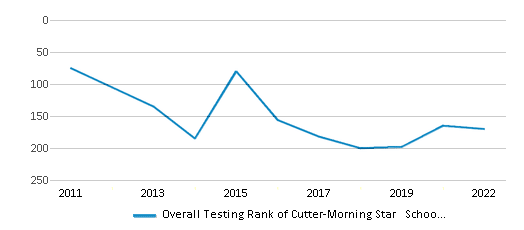
Math Test Scores (% Proficient)
28%
38%
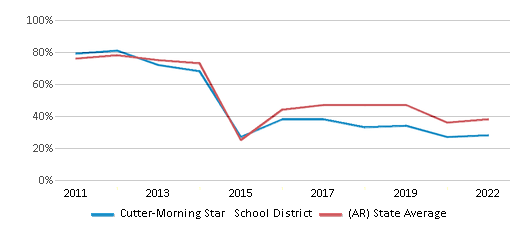
Reading/Language Arts Test Scores (% Proficient)
34%
40%
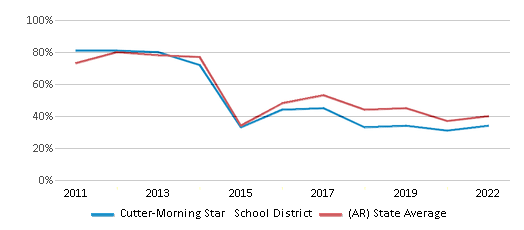
Science Test Scores (% Proficient)
30%
36%
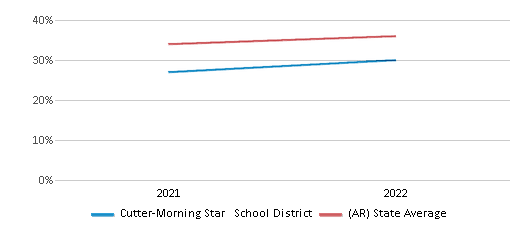
Graduation Rate
≥90%
88%
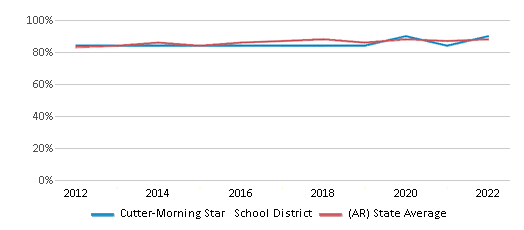
Students by Ethnicity:
Diversity Score
0.47
0.60
# American Indian Students
9 Students
846 Students
% American Indian Students
1%
1%
# Asian Students
5 Students
2,865 Students
% Asian Students
1%
2%
# Hispanic Students
90 Students
21,477 Students
% Hispanic Students
14%
14%
# Black Students
18 Students
28,045 Students
% Black Students
3%
19%
# White Students
470 Students
87,000 Students
% White Students
71%
59%
# Hawaiian Students
n/a
1,533 Students
% Hawaiian Students
n/a
1%
# Two or more races Students
69 Students
5,775 Students
% of Two or more races Students
10%
4%
Students by Grade:
# Students in PK Grade:
-
20
# Students in K Grade:
46
725
# Students in 1st Grade:
56
806
# Students in 2nd Grade:
55
836
# Students in 3rd Grade:
45
826
# Students in 4th Grade:
38
1,120
# Students in 5th Grade:
54
4,995
# Students in 6th Grade:
51
20,844
# Students in 7th Grade:
39
36,641
# Students in 8th Grade:
52
37,270
# Students in 9th Grade:
53
18,603
# Students in 10th Grade:
60
8,958
# Students in 11th Grade:
59
8,347
# Students in 12th Grade:
53
7,514
# Ungraded Students:
-
36
District Revenue and Spending
The revenue/student of $14,849 is higher than the state median of $13,132. The school district revenue/student has stayed relatively flat over four school years.
The school district's spending/student of $12,835 is less than the state median of $13,043. The school district spending/student has stayed relatively flat over four school years.
Total Revenue
$10 MM
$6,371 MM
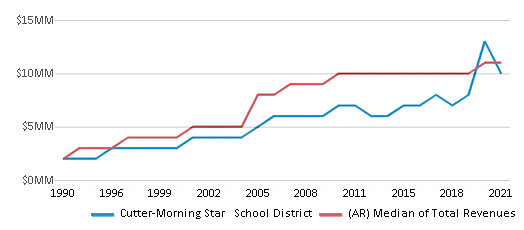
Spending
$9 MM
$6,327 MM
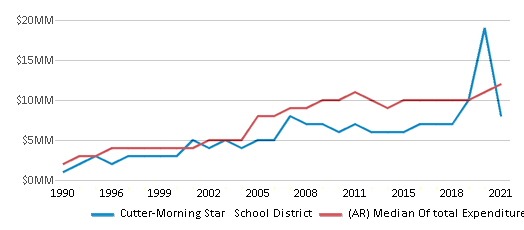
Revenue / Student
$14,849
$13,132
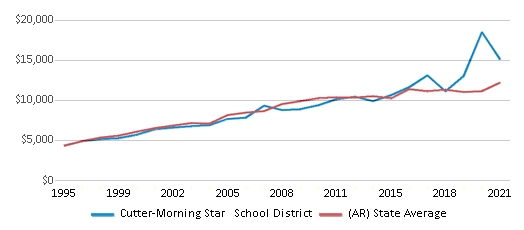
Spending / Student
$12,835
$13,043
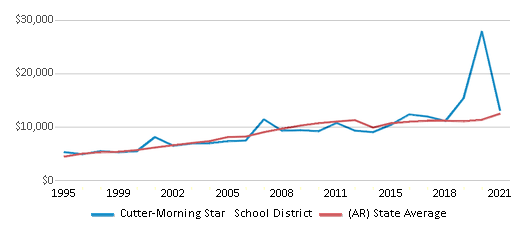
Best Cutter-Morning Star School District Public Middle Schools (2025)
School
(Math and Reading Proficiency)
(Math and Reading Proficiency)
Location
Grades
Students
Rank: #11.
Cutter-morning Star High School
(Math: 15% | Reading: 28%)
Rank:
Rank:
2/
Bottom 50%10
2801 Spring Street
Hot Springs National Park, AR 71901
(501) 262-1220
Hot Springs National Park, AR 71901
(501) 262-1220
Grades: 7-12
| 316 students
Recent Articles

Sexual Harassment at Age 6: The Tale of a First Grade Suspension
A six-year old in Aurora, Colorado, was suspended after singing an LMFAO song to a little girl in his class and reportedly “shaking his booty.” We look at the case and the sexual harassment problem in public schools today.

How Scaffolding Could Change the Way Your Child Learns
This article explores the concept of instructional scaffolding, a teaching method that enhances learning by breaking down complex tasks into manageable parts. It highlights how scaffolding supports students in developing critical thinking skills and becoming more independent learners. The article discusses the benefits of scaffolding, including improved engagement and reduced anxiety, and provides strategies for its implementation across various educational levels.

February 05, 2025
Understanding the U.S. Department of Education: Structure, Impact, and EvolutionWe explore how the Department of Education shapes American education, from its cabinet-level leadership to its impact on millions of students, written for general audiences seeking clarity on this vital institution.





